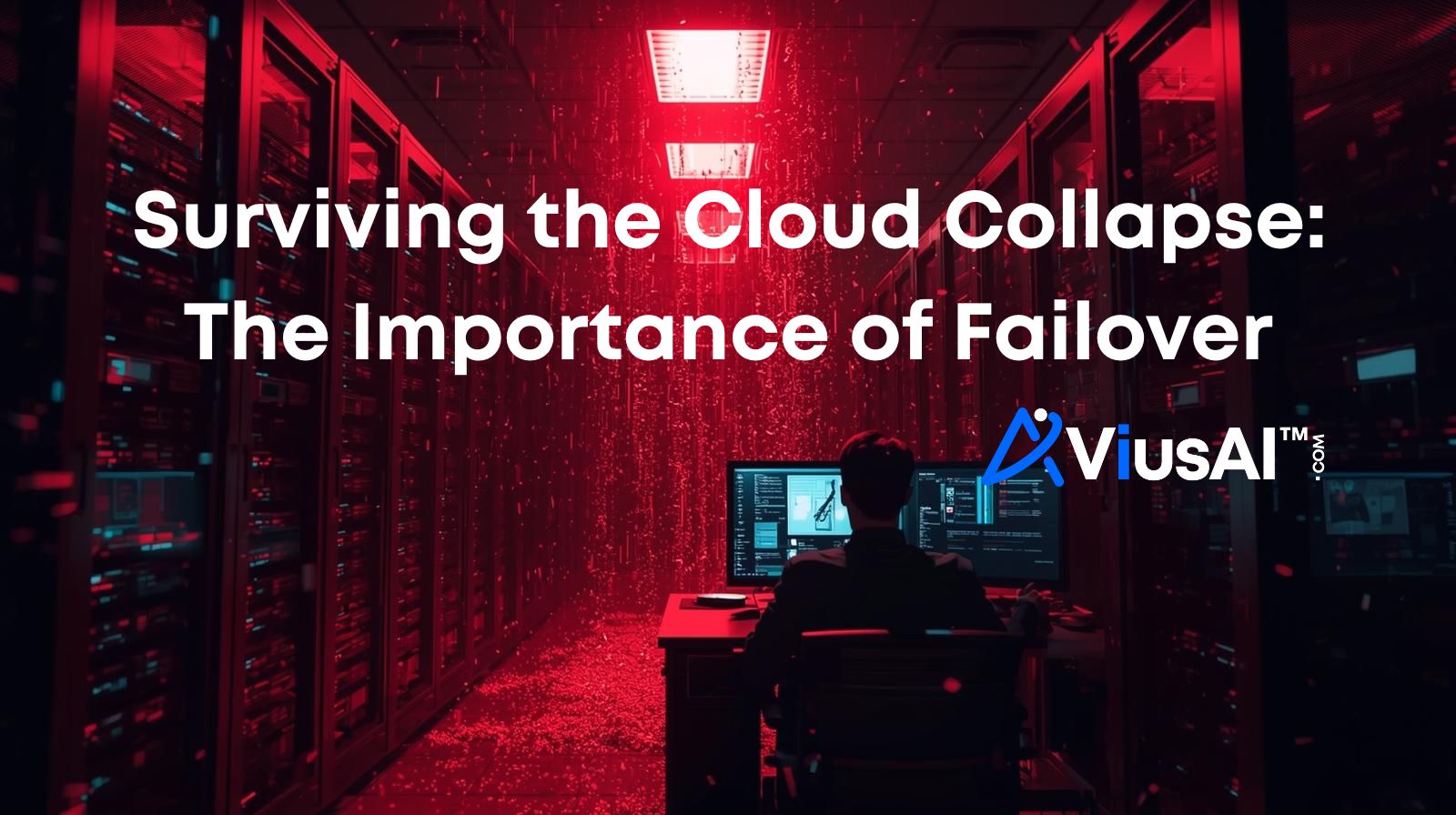Surviving the Cloud Collapse: the importance of failover systems, redundancy and going from outage chaos to AI continuity. Recent global internet outages – including those effecting Amazon, Zoom, and major service providers – underscore the critical vulnerability and reliance on centralized cloud services and network infrastructure. The outages in October 2025, especially at Amazon Web Services (AWS), caused widespread disruptions in websites, apps, and communication platforms worldwide.
Key Highlights of the Recent Outages
- AWS Outage: Major Amazon cloud services went down for several hours causing inoperability of many major websites and applications, including Snapchat, Ring, and others.
- Global Impact: Millions of user reports and service disruptions across North America, Europe, Asia, and Africa, reflecting how interconnected and fragile our internet infrastructure has become.
- Other Regional Disruptions: Power outages in Portugal, Spain, Morocco, Puerto Rico, and Maldives caused significant local internet disruptions, illustrating how physical infrastructure vulnerabilities impact global connectivity.
- Cyberattacks and Technical Failures: Ongoing cyberattacks and configuration errors continue to exacerbate outage frequency, revealing that resilience strategies are critical.
The Urgency of Being Prepared
This pattern of outages highlights an urgent need: relying solely on major cloud providers and centralized systems exposes society to catastrophic failures. Having platforms like Avius AI ensures that critical digital operations can survive and adapt, effectively saving the day during crises.
Recurring internet collapses expose our heavy dependence on centralized digital infrastructure. Comprehensive solution partners like Avius AI are the antidote to that fragility.
The Global Internet Fragility
Recent analyses from Catchpoint, APNIC, and ThousandEyes show that internet disruptions have grown more frequent and more systemic. Between August and October 2025 alone, global outages averaged over 300 per week, with 57% occurring in the United States. Major failures at AWS, Cloudflare, Microsoft and more have repeatedly knocked out critical services such as banking, logistics, and communication. Each event – like the AWS short outage on August 14 that crippled S3 (AWS) and CloudFront – highlights how interdependent and brittle our digital world has become.
Why Understanding Outages Matters
Projects like IODA (Internet Outage Detection and Analysis) and Catchpoint Internet Sonar serve as technical archives of downtime. What is missing are the stories of how outages impact humans, businesses and their employees, and customers, including insights into what these failures mean for society. These stories of outage impacts would serve to inform technologists, policymakers, and everyday users trying to make sense of an increasingly fragmented internet, and allow for outage-proofing to save connectivity and businesses, and have an Essential Resilience Partner like Avius AI.
Outages Disrupt Business Revenue and Negatively Affect Both Employees and Customers
When voice or internet services go down, daily operations grind to a halt. Employees are unable to perform essential tasks such as processing calls, accessing cloud applications, or collaborating online. This loss of productivity translates directly into lost wages and billable hours, with mid-sized companies potentially losing thousands of dollars within just a few hours of downtime.
For customers, outages mean frustration and service interruptions. Calls drop, support lines go silent, and transactions can’t be completed, leading customers to seek alternative providers. This inconvenience damages customer trust and loyalty, resulting in lost lifetime value as some customers never return. The brand’s reputation suffers as customers associate outages with business unreliability, not the internet provider.
Financially, outages can lead to missed sales opportunities, emergency IT costs, and penalties for breaching service agreements. For example, a small business outage might cost hundreds to thousands of dollars per hour, while larger enterprises face losses that can soar into millions. Beyond the immediate financial impact, these disruptions risk long-term damage to client relationships, employee morale, and competitive standing, emphasizing the vital need for redundancy and resilient infrastructure to keep revenue flowing and staff productive.
Business Continuity, Redundancy and Failover

Continuity for Data:
Imagine have two different Internet Service Providers (ISPs) for redundancy. The purpose is to ensure network availability and failover in case one ISP goes down, improving reliability. This is often implemented with configurations like Border Gateway Protocol (BGP) for automatic failover and load balancing. This setup provides true ISP redundancy by having multiple internet connections from different providers, reducing single points of failure in internet connectivity. Get help: https://aviusai.com/business-ecosystem/
Continuity for Voice:
Avius AI supports voice redundancy by leveraging its cloud-based, scalable, and resilient AI voice platform designed for high availability and operational continuity.
This solution integrates easily with existing business phone systems or entirely as the front-end of your phone system to add AI-driven voice automation with a robust redundancy strategy. That makes Avius AI an ideal choice for businesses seeking uninterrupted voice services with intelligent fail-over across multiple network providers.
In summary, Avius AI achieves voice redundancy by:
- Automatic call rerouting and load balancing within its cloud platform.
- Multi-region cloud infrastructure for geographically distributed reliability.
- AI-powered intelligent routing to maintain seamless voice interactions.
- 24/7 availability with smart workflows to prevent dropped, missed or delayed calls.
Get Help: https://aviusai.com/contact/
Have a Plan, Be Prepared
The pattern of outages highlights an urgent need. Relying solely on a single major cloud provider exposes your business to potential catastrophic failures. Having essential resilience partner platforms like Avius AI ensures that critical voice operations can survive and adapt, effectively saving the day during crises.
Redundancy planning is crucial for ensuring business continuity, minimizing downtime, and protecting revenue streams. By having backup systems, including multiple ISPs, redundant hardware, and fail-over voice solutions and protocols, organizations reduce the risk of total service outages that can cripple operations.
Effective redundancy planning guarantees that if a primary system or connection fails, secondary systems can seamlessly take over without interruption, preserving productivity and customer satisfaction.
This proactive approach not only mitigates financial losses related to downtime but also enhances trust with customers and employees by demonstrating reliability, connectivity, and commitment to service quality.
Ultimately, it acts as a vital safeguard, enabling businesses to maintain competitive advantage and avoid the cascading negative effects of outages on brand reputation, revenue, and workforce morale.
Why Avius AI is Essential in These Times
In the face of these ongoing failures, the resilience of Avius AI makes it a vital solution:
- Independent Cloud Architecture: Unlike AWS-dependent platforms, Avius AI operates on Google Cloud, with distributed architecture – designed to withstand outages of other major providers.
- Operational Continuity: During widespread network failures, Avius AI offers reliable AI-based services, enabling businesses and users to maintain essential functions without interruption.
- Resilience and Redundancy: Avius AI’s multi-region, distributed infrastructure ensures that even during global outages, critical analytics and AI-powered decision tools remain accessible.
- Future-Proofing Digital Dependence: As outages become more frequent and unpredictable, having a platform like Avius AI – designed for resilience – becomes crucial for organizations seeking stability and operational security.
Sources:
CNN: https://www.cnn.com/2025/10/20/tech/aws-why-internet-outages-keep-happening
ABC: https://www.nbcnews.com/news/us-news/amazon-web-services-outage-websites-offline-rcna238594
TIME: https://time.com/7326950/global-internet-outage-amazon-web-services-websites-apps/
CLOUDFLARE: https://blog.cloudflare.com/q2-2025-internet-disruption-summary/
TOMS GUIDE: https://www.tomsguide.com/news/live/amazon-outage-october-2025
UPTIME INSTITUTE: https://uptimeinstitute.com/resources/research-and-reports/annual-outage-analysis-2025
CISCO (THOUSAND EYES): https://www.thousandeyes.com/outages/
AVIUS AI: https://aviusai.com/features/







